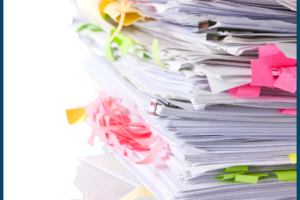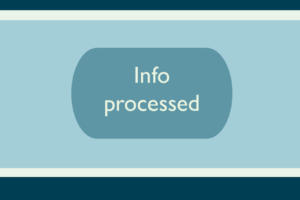
5 Ways to Organize for an Easier Estate Settlement
Death.
We don’t like to talk or think about it, yet we all die and most of us will experience the death of a friend or loved one during our own lifetime. So I’d be remiss if I didn’t share some strategies to make managing an estate a little easier, whether it is gathering the documents for your estate or helping a loved one get their affairs in order.
PRIOR PREPARATION. No one wants to think about or have a discussion regarding death, yet some preparation in advance can save a lot of time and heartache later. I’ve worked with two clients while they were settling their parent’s estates. Each was complicated due to some level of unpreparedness. As executrix of my parent’s estates, I’m doing what I can now, while they are still alive, to have everything in order to make my job easier upon their deaths.
If you work with an attorney, CPA or related professional, you may want to ask if they have a checklist. If not, google “estate planning checklist” or “estate settlement checklist” and you’ll find plenty of resources.
INFORMATION AND DOCUMENT GATHERING. This is an important part of the prior preparation. It continues after the estate settlement. Here is just a short list of documents you should have or know the location of:
- Will and any codicils.
- Monthly bills.
- Bank account and credit card records.
- Unpaid bills and loans beyond monthly expenses such as mortgage, car, taxes, etc.
- Funeral and burial wishes.
- Title to car and property.
- Stock and Bond certificates.
- Insurance policies.
- Retirement monies including 401k, pension, veteran’s benefits, social security, IRAs and others.
- Birth certificate.
- Social security number.
- Surviving family members. Identifying information including address, phone number and social security number.
- Spouse. If living: address, phone number, social security number, date of birth and date of marriage. If deceased, death certificate.
- Assets including value of personal property such as jewelry, antiques or collections.
If some or all of the data is stored online, then knowing the login information is key!
NOTE TAKING. Whether you are working on your estate documents or managing someone else’s estate, you’ll be in contact with others.
For your own estate, keep notes regarding what you have and where it’s located in addition to the reason behind your decisions.
If you’re the executor of someone else’s estate, you’ll talk to lots of people at many different places. Every time you make a call, record the date, time and person you speak with as well as the reason for calling and next action. Yes, it can seem like a lot, but it will save you time in the end. Reasons you may call are state-specific regulations for processing an estate, closing utility accounts, changing the name and/or address on accounts, finding out how to get insurance payouts, and more.
GENERAL ORGANIZATION.
Paper-based. Get a container and filing supplies. Options include, but aren’t limited to, hanging and manila folders. In this case, a plastic file box works better. File jackets with manila folders. In the beginning they might be labeled: utilities, vital documents, bank accounts, etc.
Electronic-based. If most of the documents are digital, you’ll need to decide the best way to name them and how you want to file them.
DECISIONS. For your own estate, consider keeping things as simple and straight-forward as possible. The people settling your estate will be grieving and don’t need the stress of a complicated estate.
If you are a co-executor, you may want to decide how documents will go back and forth. This is especially crucial if the co-executor lives in another city or state.
There will be other decisions that crop up which you may not have to make right away. Decide the most efficient way to track these.
What’s your take-away from this post?
Let me know your answer in the comments below.



